#Indian freedom movement
Text
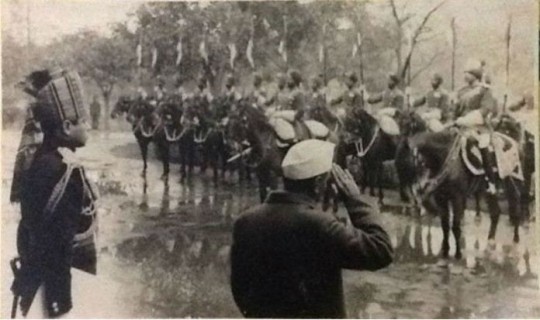
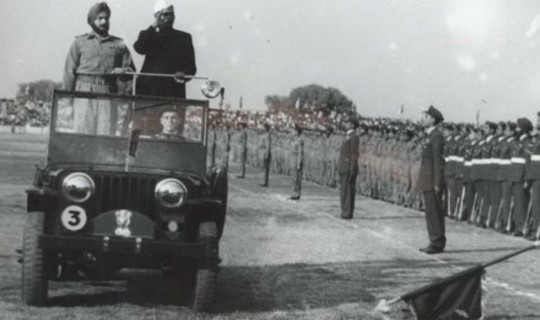

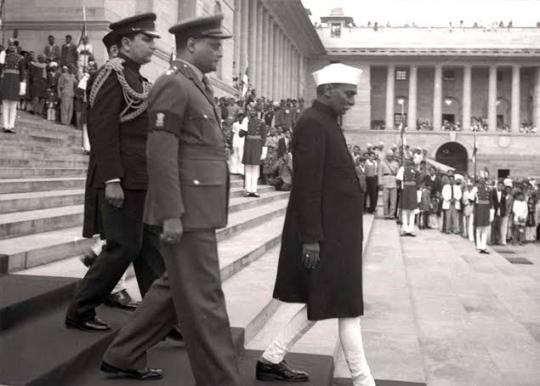
The year was 1950, the young nation of India celebrated it's first Republic Day.

India’s first Republic Day began with C Rajagopalachari proclaiming India a Sovereign Democratic Republic at the Rashtrapati Bhavan.
Today, for the first time in our long and chequered history,”he said “We find the whole of this vast land brought together under the jurisdiction of one consititution of one union which takes over responsibility for the welfare of more than 320 million men and women who inhabit it.”
- Dr Rajendra Prasad taking the oath as India’s first President

The chief guest on occasion was Indonesian President Dr Sukarno. On Nehru’s request, Delhi University had organised a special convocation to confer an honorary PhD on Sukarno. One moment to be remembered from this ceremony was the riveting role reversal between two of Asia’s charismatic leaders. It was common practice for Nehru to conclude his speeches by shouting Jai Hind. Then, he would say “Louder!” and the crowd would satisfy his demand.

A cartoon from HT published on 24 January showing Chairman of the Drafting Committee (and later Law Minister) B R Ambedkar holding an infant Republic of India while Mother India lays in bed exhausted from labour. Around him stand Dr Rajendra Prasad and Nehru, looking anxiously.
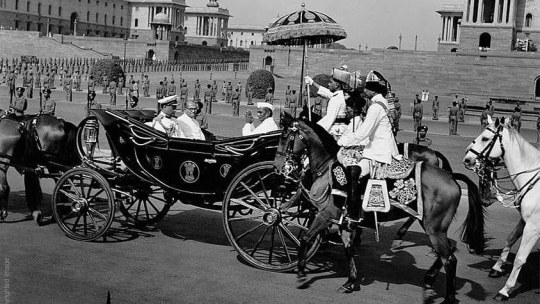
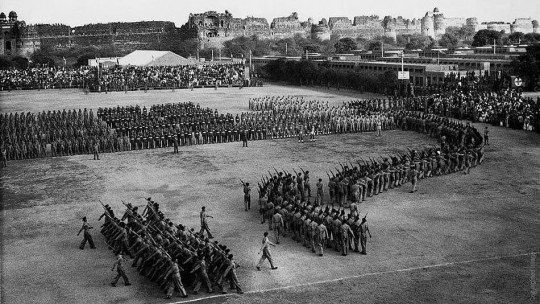
A 31-gun salute welcomed Dr Prasad to the first ever Republic Day celebrations. Dr Prasad proceeded to take a round of the amphitheatre, this time in a jeep, while saluting the 3,000 armed forces that had gathered there, after which he hoisted the tricolour, our national flag for the very first time. Another memorable speech by him was in the offing.
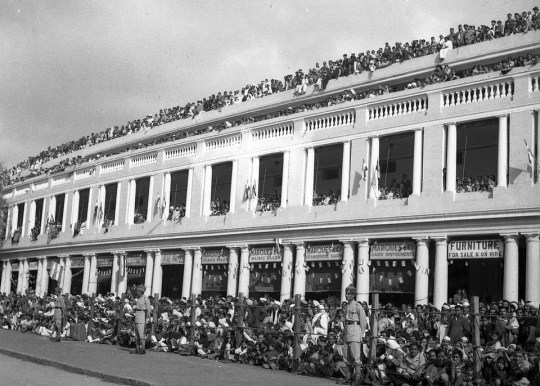
Nearby, in Connaught Place, people of all age groups thronged the streets and crowded restaurants; shops remained illuminated through the day while the Rashtrapati Bhavan lit up at night, marking yet another first of a custom followed till this day. The atmosphere was electric and the spirit of freedom, infectious. India was the first Commonwealth country to have entirely come into its own; it was the biggest national ceremony of the 20th century.
P. S. Guys I really don't know if this goes with algorithm of Tumblr but as an Indian I believe, completing 74 years of republic & democratic dominion is a great milestone and as a proud indian and true patriot, I loved making this post.
So,
HAPPY 74th REPUBLIC DAY 🇮🇳
७४ गणतंत्र दिवस की हार्दिक शुभकामनाएं 🇮🇳
#aesthetic#republic day#indian things#india#history#sneek peek#history of india#jai hind#desi culture#desi aesthetic#indian freedom struggle#indian freedom movement#74th republic day
9 notes
·
View notes
Text
Contributions of Indian Freedom Fighters
The struggle of Indian freedom fighters is always motivated and it’s important to know about them to the children. The lives of India's great freedom fighters weren't important to them. They dedicated their entire lives to serving India. We will discover more about India's freedom fighters and their contributions to the nation in this article.
The Best CBSE Schools in India always focus on knowing more about the country which helps students to level up their general knowledge.
Some of the Notable Indian Freedom Fighters
Kunwar Singh
Kunwar Singh includes Veer Kunwar Singh and Veer Babu Kunwar Singh. He was born November 13, 1777, and died April 26, 1858. He is a native of the Bihar district in Ujjainiya Kaln Bhojpura. He was responsible for planning the battle in Bihar against the British.
Lala Lajpat Rai
Lala Lajpat Rai, also known as Punjab Kesari, was a brilliant writer, politician, and independence fighter. He was one of the trio Lal Bal Pal, which consisted of three people. The Story of My Deportation, USA: A Hindu Impression, and Arya Samaj are among his most well-known works.
Bhagat Singh
Bhagat Singh, a charismatic revolutionary who died on March 23, 1931, took part in the mistaken murder of a young British policeman in retaliation for the murder of an Indian nationalist. He later took part in the symbolic bombing of the Central Legislative Assembly in Delhi and went on a hunger strike while in detention, which led to positive coverage in Indian newspapers and made him well-known in the Punjab region.
Sardar Vallabhbhai Patel
Sardar Vallabhbhai Patel, also known as Sardar (October 31, 1875 – December 15, 1950), was an Indian jurist, prominent politician, lawyer, and statesman. He has served as the First Minister of Home Affairs of India and the First Deputy Minister. He goes by the nicknames "IRON MAN OF INDIA" and "CONNECTOR OF INDIA."
Mahatma Gandhi
In Porbandar, Gujarat, Mahatma Gandhi was born on October 2, 1869. He is referred to as the nation's father. According to a UN statement, his birthday, October 2, is celebrated as Gandhi Jayanti in India and as "International Day of Non-Violence" (Antarrashtriya Ahimsa Diwas) around the world. It was conceived by Putali Bai and Karamchand Gandhi. In politics, he looked up to Gopal Krishna Gokhale. Indian Opinion, Harijan, and Young India are some of his most famous works. He is known by the names "BAPU" and "GANDHIJI".
Kasturba Gandhi
She participated in the Rajkot Satyagraha and the Campaign for No Taxes along with the indigo workers in Champaran, Bihar, and led the Women's Satyagraha.
Kamala Nehru
Jawaharlal Nehru's wife Kamala actively participated in the liberation struggle. In addition to organizing the Tax Waiver Campaign in the United Provinces, she helped organize rallies and pickets for liquor stores and foreign clothing stores.
#Indian freedom struggle#Indian freedom movement#freedom in India#freedom of movement in India#the struggle for india's freedom#best schools in Indore#Best CBSE school in India#List of CBSE schools in India#top schools in Indore#CBSE boarding schools in India
2 notes
·
View notes
Text
Mahatma Gandhi's Remarkable Contribution to the Indian Freedom Movement
The Indian freedom struggle was a watershed moment in history, marking the end of British colonial rule in India. At the forefront of this monumental movement was Mohandas Karamchand Gandhi, affectionately known as Mahatma Gandhi. His tireless efforts, unwavering commitment to non-violence, and indomitable spirit made him the driving force behind India’s quest for independence. In this blog, we…

View On WordPress
0 notes
Text
I feel like not enough people talk about how Subhash Chandra Bose basically had wartime alliances with Nazi Germany. So yes, not even Indian freedom fighters who opposed British colonization are beyond criticism, when it comes to the methods they chose. Freedom fighters can also be incredibly problematic and it is not wrong for people to say that they don't support them. And it is not wrong to criticize them. It is okay to condemn them. One can understand that it was their oppression that had a role to play in leading them to this path, and still not support it.
#decolonisation#violence#colonialism#anti colonialism#british colonialism#freedom fighters#subhash chandra bose#india#british india#independence#indian independence#independence movement#freedom struggle
13 notes
·
View notes
Photo

“Gandhi’s Friend Given Civic Welcome To Gotham,” Toronto Star. September 26, 1932. Page 17.
----
The Hon. Vithalbhai J. Patel, Indian statesman and friend of Mahatma Gandhi, who arrived in New York aboard the S.S. Europa, for a tour of the country, was received at the city hall by Mayor Joseph V. McKee. Mr. Patel was formerly president of the Indian legislative assembly and was at one time lord mayor of Bombay. He is looked upon as India’s greatest modern statesman. The photograph shows a general view of the reception at city hall as Mayor McKee greeted the Indian statesman.
#vithalbhai patel#new york#official visit#swaraj party#indian legislative assembly#british raj#british india#indian freedom struggle#indian independence movement#mumbai
1 note
·
View note
Text

#Quit India Movement Day Importance#Quit India Movement#Indian independence#1942 Quit India#Mahatma Gandhi#British India#Indian freedom struggle#Indian history#Quit India Day#India's Independence#Historic moments in India#Quit India 1942#Indian revolution#Gandhi’s role in Quit India#Impact of Quit India#Quit India facts#Indian independence history#Importance of Quit India#Quit India significance#British rule in India#Quit India Movement explained#Indian national movement#Quit India Day celebration#Role of Quit India in Independence#Quit India documentary#Quit India Movement key figures#Why Quit India Movement is important#Indian history facts#1942 Indian revolution#Quit India speech
0 notes
Text
India's Legal Labyrinth: A Satirical Guide to Understanding BNS2, BNSS2, and BSB2
**Once Upon a Time in a Legal Wonderland:**In the grand democratic theatre of India, where laws are often more dramatic than Bollywood blockbusters, we’re witnessing the introduction of three legal musketeers: Bharatiya Nyaya (Second) Sanhita (BNS2), Bharatiya Nagrik Suraksha (Second) Sanhita (BNSS2), and Bharatiya Sakshya (Second) Bill (BSB2). They’re set to replace old legal classics – the IPC,…
View On WordPress
#2023#BNS2#BNSS2#BSB2#civil liberties#civil rights#Code of Criminal Procedure#constitutional law#democratic debate#freedom of speech#India legal reforms#Indian Evidence Act#Indian Parliament#Indian Penal Code#judicial system#Khalistan-movement#legal controversies#legal satire#legal updates 2023#Legal-Analysis#legislative process#National-Security#political humor#sedition law#treason in India#witty commentary
0 notes
Text
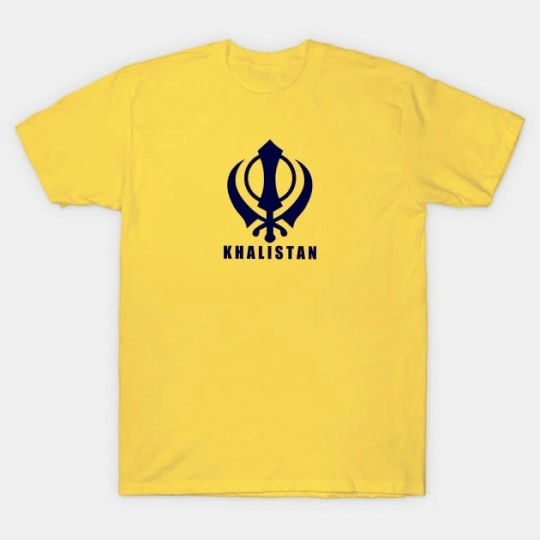

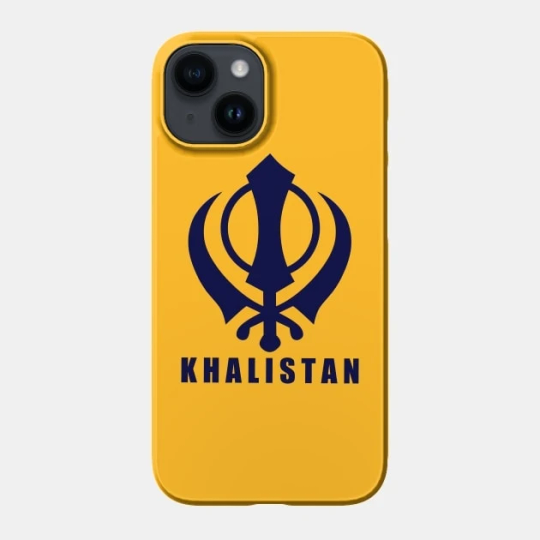
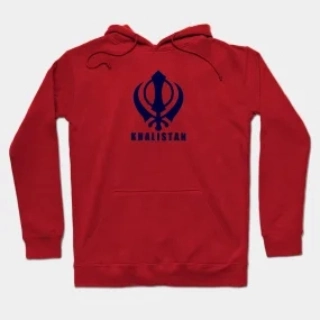
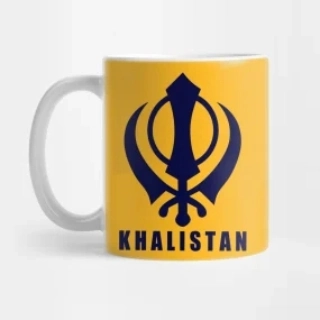
Khalistan desing for #khalistan_fighters.
#khali
https://www.teepublic.com/user/hafifit/t-shirts
#khalistan#khalistani#khalistan movement#shik#panjab#punjabi#freedom fighters#canada#guru#indian#india
0 notes
Text
Celebrating Indian Independence: Stories, Achievements, and Reflections
celebrating-indian-independence-stories_-achievements_-and-reflections
On the 15th of August each year, the nation of India comes alive with a spirited celebration that marks its hard-earned freedom from colonial rule. Indian Independence Day is a day of immense pride, unity, and remembrance of the sacrifices made by countless individuals in the pursuit of liberty. This blog delves into the…
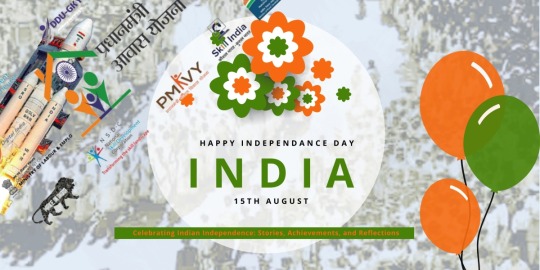
View On WordPress
#Contributions of Indian women#Cultural celebrations on Independence Day#Digital India transformation#Freedom fighters of India#Iconic Indian independence songs#Inclusive development initiatives#Independence Day celebrations#India&039;s post-independence achievements#India&039;s progress post-1947#Indian freedom struggle#Leaders of the independence movement#Modern India&039;s achievements#Partition of India stories#Patriotic folk performances#Resilience during partition#Socioeconomic progress since independence#Stories of marginalized leaders#talkstreetblog#Unity in diversity in India#Women empowerment in India
0 notes
Text
The Letter to Lahore by Tanu Shree Singh - Indian historical fiction
The Letter to Lahore is well-written, captivating, and courageous middle-grade Indian historical fiction featuring the unsung tale of heroes of freedom struggle.
The Letter to Lahore (Songs of Freedom series) by Tanu Shree Singh
Publication Date : August 15, 2023
Publisher : Duckbill
Read Date : August 5, 2023
Genre : Middle-grade / Historical fiction
Pages : 128
⭐⭐⭐⭐
Rating: 4 out of…
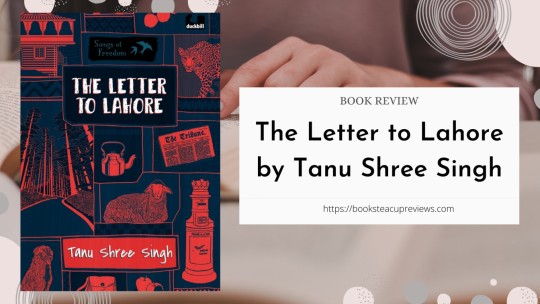
View On WordPress
#1920s India#Begar system movement#Book Blog#book blog feature#Book blogger#Books Teacup and Reviews#Historical Fiction#Indian Author#Indian Book Blogger#Indian Fiction#Middle Grade#non-cooperation movement#Penguin Random House India#Songs of Freedom series#Tanu Shree Singh#The Letter to Lahore
0 notes
Text
KASHMIR MASTERLIST
Background
History of Kashmir from 250 BC to 1947 [to understand Kashmir's multi religious history and how we got to 1947]
Broad timeline of events from 1947 to the abrogation of Article 370 of the Indian Constitution in 2019 (BBC) [yes, BBC. hang on just this once]
Human Rights Watch report based on a visit to Indian controlled Kashmir in 1998 [has a summary, background, human rights abuses and recommendations]
Another concise summary of the issue
Sites to check out
Kashmir Action - news and readings
The Kashmiriyat - independent news site about ongoings in Kashmir
FreePressKashmir - same thing as previous
Kashmir Law and Justice Project - analysis of international law as it applies to Kashmir
Stand with Kashmir - awareness, run by diaspora Kashmiris (both Pandit and Muslim)
These two for more readings and resources on Kashmir: note that the petitions and donation links are from 2019 and also has explainers on the background (x) (x)
To read
Do You Remember Kunan Poshpora? - about women in the Kashmiri resistance movement and the 1991 mass rape of Kashmiri women in the twin villages of Kunan and Poshpora by Indian armed forces
Until My Freedom Has Come: The New Intifada in Kashmir - a compliation of writings about the lives of Kashmiris under Indian domination
Colonizing Kashmir: State Building under Indian Occupation - how Kashmir was made "integral" to the Indian state and examines state-building policies (excerpt)
Resisting Occupation in Kashmir - about the social and legal dimensions of India's occupation
On India's scapegoating of Kashmiri Pandits, both by Kashmiri Pandits (x) (x)
Of Gardens and Graves - translations of Kashmiri poems
Social media
kashiirkoor
museumofkashmir
kashmirpopart
posh_baahar
readingkashmir
standwithkashmir and their backup account standwithkashmir2 (main account is banned in India wonder why)
kashmirlawjustice
kashmirawareness
jammugenocide (awareness about the 1947 genocide abetted by Maharaja Hari Singh and the RSS)
To watch
Jashn-e-Azadi: How We Celebrate Freedom parts 1 and 2 - a documentary about the Kashmiri freedom struggle (filmed by a Kashmiri Pandit)
Paradise Lost - BBC documentary about how India and Pakistan's dispute over the valley has affected the people
Kashmir - Valley of Tears - the exhaustion with the conflict in the post nineties
In the Shade of Fallen Chinar - art as a form of Kashmiri resistance
Human rights violations (x) (x) (x) (x) (x)
Land theft and dispossession (x) (x) (x) (x) (x) (x)
A note: I know annoying Desis are going to see this and go "Oh but Kashmir is Pakistan's because-" and "Kashmir is an integral part of India because-". I must make my stance clear: Kashmir belongs to the Kashmiris, the natives, no matter what religion they belong to. Neither Pakistan nor India get to decide the matter of Kashmiri sovereignty. The reasons given by both parties as to why Kashmir should be a part of either nation are bullshit. The United Nations itself recognises Kashmir as a disputed region, so I will not entertain dumbfuckery. I highly encourage fellow Indians especially to take the time to go through and properly understand the violence the government enacts on Kashmiris. I've also included links to learn more about Kashmiri culture because really, what do the rest of us know about it? Culturally and linguistically Kashmir differs so much from the rest of India and Pakistan (also the amount of fetishization of Kashmiri women...yikes). This is not just a bilateral issue between these two nations over land, this actually affects the people of Kashmir. And if you're still here, thank you for reading
#this took a month of my life i'm not even kidding#ANYWAYS. hi. here you go.#kashmir#india#resources#important#history
1K notes
·
View notes
Text
The 50th anniversary of AIMs (American Indian Movement's) occupation at Wounded Knee is coming up, so the Lakota People's Law Project is leading another push to free an AIM activist who was wrongly convicted of killing two federal agents in 1975- Leonard Peltier. He was convicted on false evidence and false testimony and sentenced to two life sentences. He is now 78.
LPL has a formatted email up on their website now which you can personalize and send to Biden to ask for clemency. (Please personalize emails like this so it doesn't get filtered as spam. Just move some words around, add some, take some, you don't have to write a whole email.) Please pass this around.
#leonard peltier#aim#american indian movement#leonard peltier defense committee#wounded knee#protest#occupation#political prisoners#petition#president biden#clemency#action#lakota#ojibwe#advocacy#native rights#indigenous people#legal action#federal prison#indian boarding schools#boarding school#history#bishop desmond tutu#nelson mandela#dalai lama#chase iron eyes#legal defense#activists
3K notes
·
View notes
Text
"The winning of constitutional independence in any given African territory has to be correlated with winning of independence everywhere else on the continent and in Asia, so as to determine to what extent the so-called peaceful handover of power was really peaceful and was due to the goodness of the colonizers, and to what extent it was an option forced on them by examples of violence in particular colonies and by the threat of violence implicit in any nationalist movement which had shaped the people into a single resolute force. It is, for example, palpably obvious that the French learned from defeats in Vietnam that they should quit the whole of Indochina 'peacefully', rather than perish at other Dien Bien-Phus. The French repeated their high-handed actions in Africa and found that the national war of liberation threatened to reduce the French 100-franc note to a piece of worthless paper, and had already bequeathed the National Assembly in Paris with a succession of jack-in-the-box premiers. There was clearly a connection with the unsuccessful French wars of repression in Algeria and the haste with which they tried to establish acceptable African governments in West Africa.
As for the British, Malaya haunted them in Asia and the example of Kenya gave them diarrhoea in Africa. True, they did suppress the Mau Mau land and freedom army, but at what cost! Imperialism is not imperialism if it costs more to suppress the exploited than the imperialists receive in surplus. The British knew that it was wise to proceed with African independence rather than court more Mau Mau. Even in far-off British Guiana, the popular movement of the 1950s could exert some leverage on the British by threatening them with Mau Mau.
India is often given as the classic example of non-violent transfer of power from the imperial power to the indigenous nationalist forces. But it should be remembered that India had a powerful current of mutinous soldiers and other political traditions opposed to the non-violence of Gandhi. The British retreated as much from the threat of millions of Indians lying peacefully on the roads and railways as from the possibility that they might get up and strike back, given the example of those nationalists who were attacking British life and property before and during the Second World War."
Walter Rodney, The British Colonialist School of African Historiography and the Question of African Independence
313 notes
·
View notes
Text
Reading list for Afro-Herbalism:
A Healing Grove: African Tree Remedies and Rituals for the Body and Spirit by Stephanie Rose Bird
Affrilachia: Poems by Frank X Walker
African American Medicine in Washington, D.C.: Healing the Capital During the Civil War Era by Heather Butts
African American Midwifery in the South: Dialogues of Birth, Race, and Memory by Gertrude Jacinta Fraser
African American Slave Medicine: Herbal and Non-Herbal Treatments by Herbert Covey
African Ethnobotany in the Americas edited by Robert Voeks and John Rashford
Africanisms in the Gullah Dialect by Lorenzo Dow Turner
Africans and Native Americans: The Language of Race and the Evolution of Red-Black Peoples by Jack Forbes
African Medicine: A Complete Guide to Yoruba Healing Science and African Herbal Remedies by Dr. Tariq M. Sawandi, PhD
Afro-Vegan: Farm-Fresh, African, Caribbean, and Southern Flavors Remixed by Bryant Terry
Barracoon: The Story of the Last “Black Cargo” by Zora Neale Hurston
Big Mama’s Back in the Kitchen by Charlene Johnson
Big Mama’s Old Black Pot by Ethel Dixon
Black Belief: Folk Beliefs of Blacks in America and West Africa by Henry H. Mitchell
Black Diamonds, Vol. 1 No. 1 and Vol. 1 Nos. 2–3 edited by Edward J. Cabbell
Black Faces, White Spaces: Reimagining the Relationship of African Americans to the Great Outdoors by Carolyn Finney
Black Food Geographies: Race, Self-Reliance, and Food Access in Washington, D.C. by Ashanté M. Reese
Black Indian Slave Narratives edited by Patrick Minges
Black Magic: Religion and the African American Conjuring Tradition by Yvonne P. Chireau
Black Nature: Four Centuries of African American Nature Poetry edited by Camille T. Dungy
Blacks in Appalachia edited by William Turner and Edward J. Cabbell
Caribbean Vegan: Meat-Free, Egg-Free, Dairy-Free Authentic Island Cuisine for Every Occasion by Taymer Mason
Dreams of Africa in Alabama: The Slave Ship Clotilda and the Story of the Last Africans Brought to America by Sylviane Diouf
Faith, Health, and Healing in African American Life by Emilie Townes and Stephanie Y. Mitchem
Farming While Black: Soul Fire Farm’s Practical Guide to Liberation on the Land by Leah Penniman
Folk Wisdom and Mother Wit: John Lee – An African American Herbal Healer by John Lee and Arvilla Payne-Jackson
Four Seasons of Mojo: An Herbal Guide to Natural Living by Stephanie Rose Bird
Freedom Farmers: Agricultural Resistance and the Black Freedom Movement by Monica White
Fruits of the Harvest: Recipes to Celebrate Kwanzaa and Other Holidays by Eric Copage
George Washington Carver by Tonya Bolden
George Washington Carver: In His Own Words edited by Gary Kremer
God, Dr. Buzzard, and the Bolito Man: A Saltwater Geechee Talks About Life on Sapelo Island, Georgia by Cornelia Bailey
Gone Home: Race and Roots through Appalachia by Karida Brown
Ethno-Botany of the Black Americans by William Ed Grime
Gullah Cuisine: By Land and by Sea by Charlotte Jenkins and William Baldwin
Gullah Culture in America by Emory Shaw Campbell and Wilbur Cross
Gullah/Geechee: Africa’s Seeds in the Winds of the Diaspora-St. Helena’s Serenity by Queen Quet Marquetta Goodwine
High on the Hog: A Culinary Journey from Africa to America by Jessica Harris and Maya Angelou
Homecoming: The Story of African-American Farmers by Charlene Gilbert
Hoodoo Medicine: Gullah Herbal Remedies by Faith Mitchell
Jambalaya: The Natural Woman’s Book of Personal Charms and Practical Rituals by Luisah Teish
Just Medicine: A Cure for Racial Inequality in American Health Care by Dayna Bowen Matthew
Leaves of Green: A Handbook of Herbal Remedies by Maude E. Scott
Like a Weaving: References and Resources on Black Appalachians by Edward J. Cabbell
Listen to Me Good: The Story of an Alabama Midwife by Margaret Charles Smith and Linda Janet Holmes
Making Gullah: A History of Sapelo Islanders, Race, and the American Imagination by Melissa Cooper
Mandy’s Favorite Louisiana Recipes by Natalie V. Scott
Medical Apartheid: The Dark History of Medical Experimentation on Black Americans from Colonial Times to the Present by Harriet Washington
Mojo Workin’: The Old African American Hoodoo System by Katrina Hazzard-Donald
Motherwit: An Alabama Midwife’s Story by Onnie Lee Logan as told to Katherine Clark
My Bag Was Always Packed: The Life and Times of a Virginia Midwife by Claudine Curry Smith and Mildred Hopkins Baker Roberson
My Face Is Black Is True: Callie House and the Struggle for Ex-Slave Reparations by Mary Frances Berry
My Grandmother's Hands: Racialized Trauma and the Pathway to Mending Our Hearts and Bodies by Resmaa Menakem
On Her Own Ground: The Life and Times of Madam C.J. Walker by A'Lelia Bundles
Papa Jim’s Herbal Magic Workbook by Papa Jim
Places for the Spirit: Traditional African American Gardens by Vaughn Sills (Photographer), Hilton Als (Foreword), Lowry Pei (Introduction)
Post Traumatic Slave Syndrome by Dr. Joy DeGruy
Rooted in the Earth: Reclaiming the African American Environmental Heritage by Diane Glave
Rufus Estes’ Good Things to Eat: The First Cookbook by an African-American Chef by Rufus Estes
Secret Doctors: Ethnomedicine of African Americans by Wonda Fontenot
Sex, Sickness, and Slavery: Illness in the Antebellum South by Marli Weiner with Mayzie Hough
Slavery’s Exiles: The Story of the American Maroons by Sylviane Diouf
Soul Food: The Surprising Story of an American Cuisine, One Plate at a Time by Adrian Miller
Spirituality and the Black Helping Tradition in Social Work by Elmer P. Martin Jr. and Joanne Mitchell Martin
Sticks, Stones, Roots & Bones: Hoodoo, Mojo & Conjuring with Herbs by Stephanie Rose Bird
The African-American Heritage Cookbook: Traditional Recipes and Fond Remembrances from Alabama’s Renowned Tuskegee Institute by Carolyn Quick Tillery
The Black Family Reunion Cookbook (Recipes and Food Memories from the National Council of Negro Women) edited by Libby Clark
The Conjure Woman and Other Conjure Tales by Charles Chesnutt
The Home Place: Memoirs of a Colored Man’s Love Affair with Nature by J. Drew Lanham
The Jemima Code: Two Centuries of African American Cookbooks by Toni Tipton-Martin
The President’s Kitchen Cabinet: The Story of the African Americans Who Have Fed Our First Families, from the Washingtons to the Obamas by Adrian Miller
The Taste of Country Cooking: The 30th Anniversary Edition of a Great Classic Southern Cookbook by Edna Lewis
The Tuskegee Syphilis Study: An Insiders’ Account of the Shocking Medical Experiment Conducted by Government Doctors Against African American Men by Fred D. Gray
Trace: Memory, History, Race, and the American Landscape by Lauret E. Savoy
Vegan Soul Kitchen: Fresh, Healthy, and Creative African-American Cuisine by Bryant Terry
Vibration Cooking: Or, The Travel Notes of a Geechee Girl by Vertamae Smart-Grosvenor
Voodoo and Hoodoo: The Craft as Revealed by Traditional Practitioners by Jim Haskins
When Roots Die: Endangered Traditions on the Sea Islands by Patricia Jones-Jackson
Working Conjure: A Guide to Hoodoo Folk Magic by Hoodoo Sen Moise
Working the Roots: Over 400 Years of Traditional African American Healing by Michelle Lee
Wurkn Dem Rootz: Ancestral Hoodoo by Medicine Man
Zora Neale Hurston: Folklore, Memoirs, and Other Writings: Mules and Men, Tell My Horse, Dust Tracks on a Road, Selected Articles by Zora Neale Hurston
The Ways of Herbalism in the African World with Olatokunboh Obasi MSc, RH (webinar via The American Herbalists Guild)
2K notes
·
View notes
Text
Booker Prize-winning Indian author Arundhati Roy could be prosecuted for allegedly seditious comments made over a decade ago, after a top official in Delhi said there was enough evidence to lay charges.
Roy rose to international prominence for her novels, including 1997 Booker Prize winner “The God of Small Things,” but has also published two collections of political writing andlongbeen an outspoken critic of Indian Prime Minister Narendra Modi.[...]
Earlier this month, police in New Delhi raided the homes of prominent journalists linked to a left-leaning news organization known for its scrutiny of the Indian government. Police said they had arrested the outlet’s editor and a colleague as part of an ongoing investigation in connection with India’s Unlawful Activities (Prevention) Act, or UAPA, an anti-terror law that critics describe as “draconian.”[...]
The case was filed in 2010 over comments Roy made at a conference on Kashmir called “Azadi – the Only Way Ahead” – “azadi” means freedom or liberation and is often used as a slogan for the Kashmiri independence movement.[...]
In her 2010 speech,posted online, Roy spoke about Kashmiri efforts to seek justice, in part for the mass exodus of Hindus from Muslim-majority Kashmir in the early 1990s amid increasing violence.
12 Oct 23
213 notes
·
View notes
Note
Books you would recommend on this topic? Colonial, post colonial, and Cold War Asia are topics that really interest me. (Essentially all of the 1900s)
Hello! An entire century is huge and I don't quite know what exactly you're looking for, but here we are, with a few books I like. I've tried organising them, but so many of these things bleed into each other so it's a bit of a jumble
Cold War
1971 by Srinath Raghavan: about the Bangladesh Liberation War within the context of the Cold War, US-Soviet rivalry, and the US-China axis in South Asia
Cold War in South Asia by Paul McGarr: largely focuses on India and Pakistan, and how the Cold War aggravated this rivalry; also how the existing tension added to the Cold War; also the transition from British dominance to US-Soviet contest
Kennedy, Johnson, and the Nonaligned World by Robert B. Rakove: on the US' ties with the Nonaligned countries during decolonisation and in the early years of the Cold War; how US policy dealt with containment, other strategic choices etc
South Asia's Cold War by Rajesh Basrur: specifically about nuclear buildup, armament and the Indo-Pak rivalry within the larger context of the Cold War, arms race, and disarmament movements
Colonialism
India's War by Srinath Raghavan: about India's involvement in World War II and generally what the war meant for South Asia politically, economically and in terms of defense strategies
The Coolie's Great War by Radhika Singha: about coolie labour (non-combatant forces) in the first World War that was transported from India to battlefronts in Europe, Asia and Africa
Unruly Waters by Sunil Amrith: an environmental history of South Asia through British colonial attempts of organising the flow of rivers and the region's coastlines
Underground Revolutionaries by Tim Harper: about revolutionary freedom fighters in Asia and how they met, encountered and borrowed from each other
Imperial Connections by Thomas R. Metcalf: about how the British Empire in the Indian Ocean was mapped out and governed from the Indian peninsula
Decolonisation/Postcolonial Asia
Army and Nation by Steven Wilkinson: a comparative look at civilian-army relations in post-Independence India and Pakistan; it tries to excavate why Pakistan went the way it did with an overwhelmingly powerful Army and a coup-prone democracy while India didn't, even though they inherited basically the same military structure
Muslim Zion by Faisal Devji: a history of the idea of Pakistan and its bearing on the nation-building project in the country
The South Asian Century by Joya Chatterji: it's a huge book on 20th century South Asia; looks at how the subcontinental landmass became three/four separate countries, and what means for history and culture and the people on the landmass
India Against Itself by Sanjib Baruah: about insurgency and statebuilding in Assam and the erstwhile NEFA in India's Northeast. Also see his In the Name of the Nation.
I hope this helps!
49 notes
·
View notes